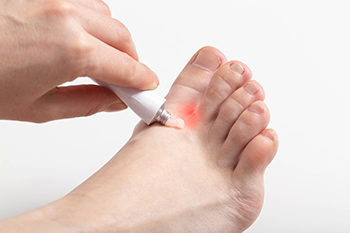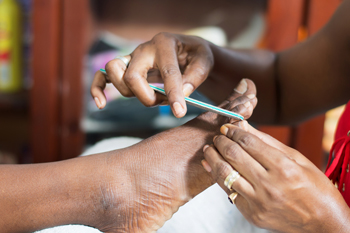
Runners can experience pain in the arch of the foot that may be caused by a variety of factors. Some structural causes include high arches, flat feet, and arthritis. Examples of outside factors include the type of running shoes you wear, how you run, and where you run. It may be wise to start with an inventory of your footwear. Rotating pairs of shoes is a great way to prevent putting pressure on the same spot every time you run. And as a rule, it’s a good idea to get new shoes every 350 miles or 6 months, whichever comes first. You may need to see a podiatrist to evaluate how you place your feet and see if you would benefit from custom orthotics for extra cushioning and better arch support. It helps to avoid running on pavement or concrete surfaces and find softer ground to run on. Stretching your feet prior to running is suggested as a way to increase flexibility and keep muscles from tightening. Massaging your feet after each run can increase blood flow and release built-up muscle tension. If you continue to have arch pain during or after you run, it’s a good idea to see a podiatrist regularly for treatment advice.
All runners should take extra precaution when trying to avoid injury. If you have any concerns about your feet, contact the podiatrists of The Foot & Ankle Center of New Jersey. Our doctors will treat your foot and ankle needs.
How to Prevent Running Injuries
There are a lot of mistakes a runner can make prior to a workout that can induce injury. A lot of athletes tend to overstretch before running, instead of saving those workouts for a post-run routine. Deep lunges and hand-to-toe hamstring pulls should be performed after a workout instead of during a warmup. Another common mistake is jumping into an intense routine before your body is physically prepared for it. You should try to ease your way into long-distance running instead of forcing yourself to rush into it.
More Tips for Preventing Injury
If you have any questions, please feel free to contact our office located in Paramus, NJ . We offer the newest diagnostic and treatment technologies for all your foot care needs.
 Tinea Pedis, more commonly known as athlete’s foot, is a fungal infection that affects the feet and toes. The fungi that cause athlete’s foot thrive in warm and moist environments. The condition is very contagious and often spreads in areas such as communal locker rooms, pools, showers, and even sweaty footwear. Common signs of athlete’s foot include scaling, redness, itchiness, and in severe cases, fissuring (or deep cracking) of the skin. Since athlete’s foot can spread easily, patients who believe they have this condition would be wise to consult with a podiatrist for a proper diagnosis and treatment plan. The infection will likely need to be treated with antifungal medications, and measures may need to be implemented to keep the feet clean and dry.
Tinea Pedis, more commonly known as athlete’s foot, is a fungal infection that affects the feet and toes. The fungi that cause athlete’s foot thrive in warm and moist environments. The condition is very contagious and often spreads in areas such as communal locker rooms, pools, showers, and even sweaty footwear. Common signs of athlete’s foot include scaling, redness, itchiness, and in severe cases, fissuring (or deep cracking) of the skin. Since athlete’s foot can spread easily, patients who believe they have this condition would be wise to consult with a podiatrist for a proper diagnosis and treatment plan. The infection will likely need to be treated with antifungal medications, and measures may need to be implemented to keep the feet clean and dry.
Athlete’s foot is an inconvenient condition that can be easily reduced with the proper treatment. If you have any concerns about your feet and ankles, contact the podiatrists from The Foot & Ankle Center of New Jersey. Our doctors will treat your foot and ankle needs.
Athlete’s Foot: The Sole Story
Athlete's foot, also known as tinea pedis, can be an extremely contagious foot infection. It is commonly contracted in public changing areas and bathrooms, dormitory style living quarters, around locker rooms and public swimming pools, or anywhere your feet often come into contact with other people.
Solutions to Combat Athlete’s Foot
Athlete’s foot can cause many irritating symptoms such as dry and flaking skin, itching, and redness. Some more severe symptoms can include bleeding and cracked skin, intense itching and burning, and even pain when walking. In the worst cases, Athlete’s foot can cause blistering as well. Speak to your podiatrist for a better understanding of the different causes of Athlete’s foot, as well as help in determining which treatment options are best for you.
If you have any questions please feel free to contact our office located in Paramus, NJ . We offer the newest diagnostic and treatment technologies for all your foot and ankle needs.
 Even though we depend on our feet to get us around all day, it is easy to forget to give them the care they need. Selecting appropriate shoes to keep the feet healthy and safe is important. First and foremost is choosing shoes that fit well, give proper support, and will help to keep you from slipping and falling. Pay attention to the cushioning inside your shoes, especially if you spend a lot of time standing. Arch supports can help distribute the weight so the pressure is not all on the heel and ball of the foot. High heels can cause all kinds of problems, including hammertoes, bunions, calluses and corns, as well as negatively affecting your posture and alignment. It is particularly important to wear the proper shoe for each activity, paying attention to support, cushioning, width and stability. If your feet change in shape or color, begin to hurt, or feel sore on a regular basis, it is a good idea to visit a podiatrist for a complete examination to determine whether you may need custom orthotics or other treatment.
Even though we depend on our feet to get us around all day, it is easy to forget to give them the care they need. Selecting appropriate shoes to keep the feet healthy and safe is important. First and foremost is choosing shoes that fit well, give proper support, and will help to keep you from slipping and falling. Pay attention to the cushioning inside your shoes, especially if you spend a lot of time standing. Arch supports can help distribute the weight so the pressure is not all on the heel and ball of the foot. High heels can cause all kinds of problems, including hammertoes, bunions, calluses and corns, as well as negatively affecting your posture and alignment. It is particularly important to wear the proper shoe for each activity, paying attention to support, cushioning, width and stability. If your feet change in shape or color, begin to hurt, or feel sore on a regular basis, it is a good idea to visit a podiatrist for a complete examination to determine whether you may need custom orthotics or other treatment.
Everyday foot care is very important to prevent infection and other foot ailments. If you need your feet checked, contact the podiatrists from The Foot & Ankle Center of New Jersey. Our doctors can provide the care you need to keep you pain-free and on your feet.
Everyday Foot Care
Often, people take care of their bodies, face and hair more so than they do for their feet. But the feet are a very important aspect of our bodies, and one that we should pay more attention to. Without our feet, we would not be able to perform most daily tasks.
It is best to check your feet regularly to make sure there are no new bruises or cuts that you may not have noticed before. For dry feet, moisturizer can easily be a remedy and can be applied as often as necessary to the affected areas. Wearing shoes that fit well can also help you maintain good foot health, as well as making it easier to walk and do daily activities without the stress or pain of ill-fitting shoes, high heels, or even flip flops. Wearing clean socks with closed shoes is important to ensure that sweat and bacteria do not accumulate within the shoe. Clean socks help to prevent Athlete’s foot, fungi problems, bad odors, and can absorb sweat.
If you have any questions please feel free to contact our office located in Paramus, NJ . We offer the newest diagnostic and treatment technologies for all your foot and ankle needs.
Multiple sclerosis (MS) is an autoimmune disease in which the immune system attacks and destroys otherwise healthy nerve cell linings in the brain and spinal cord. This impairs nerve function and causes symptoms throughout the body – including in the feet. Many people who have MS suffer from dysesthesia, or abnormal sensations in the skin. When dysesthesia affects the feet, you may experience symptoms ranging from a mild itching or burning sensation or pins and needles, to a severe feeling of the feet “being on fire” or “electrically shocked.” Despite any sensations of heat, the feet themselves will remain cool to the touch. This is because the burning sensations are caused by impaired nervous system functioning. Fortunately, there are things you can do to relieve pain, such as wearing special pressure socks. If you have MS, a podiatrist can help you manage your foot health.
Neuropathy
Neuropathy can be a potentially serious condition, especially if it is left undiagnosed. If you have any concerns that you may be experiencing nerve loss in your feet, consult with the podiatrists from The Foot & Ankle Center of New Jersey. Our doctors will assess your condition and provide you with quality foot and ankle treatment for neuropathy.
What Is Neuropathy?
Neuropathy is a condition that leads to damage to the nerves in the body. Peripheral neuropathy, or neuropathy that affects your peripheral nervous system, usually occurs in the feet. Neuropathy can be triggered by a number of different causes. Such causes include diabetes, infections, cancers, disorders, and toxic substances.
Symptoms of Neuropathy Include:
Those with diabetes are at serious risk due to being unable to feel an ulcer on their feet. Diabetics usually also suffer from poor blood circulation. This can lead to the wound not healing, infections occurring, and the limb may have to be amputated.
Treatment
To treat neuropathy in the foot, podiatrists will first diagnose the cause of the neuropathy. Figuring out the underlying cause of the neuropathy will allow the podiatrist to prescribe the best treatment, whether it be caused by diabetes, toxic substance exposure, infection, etc. If the nerve has not died, then it’s possible that sensation may be able to return to the foot.
Pain medication may be issued for pain. Electrical nerve stimulation can be used to stimulate nerves. If the neuropathy is caused from pressure on the nerves, then surgery may be necessary.
If you have any questions, please feel free to contact our office located in Paramus, NJ . We offer the newest diagnostic and treatment technologies for all your foot care needs.